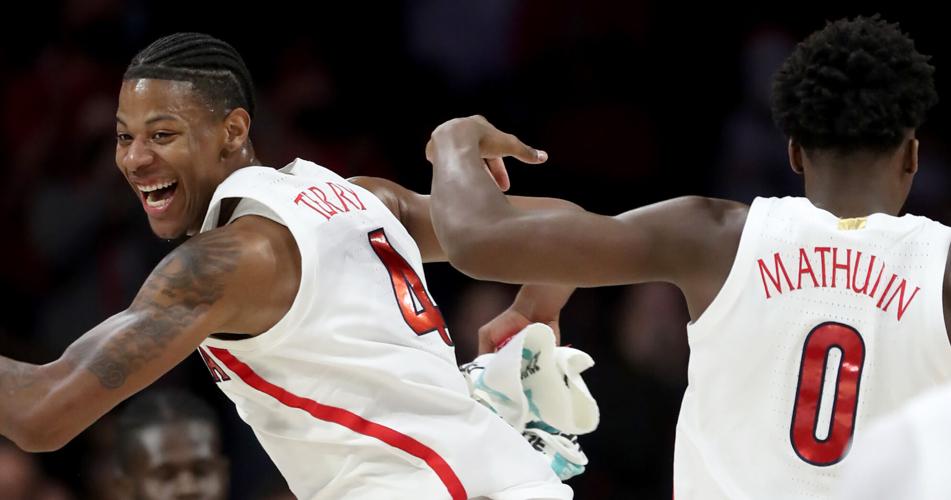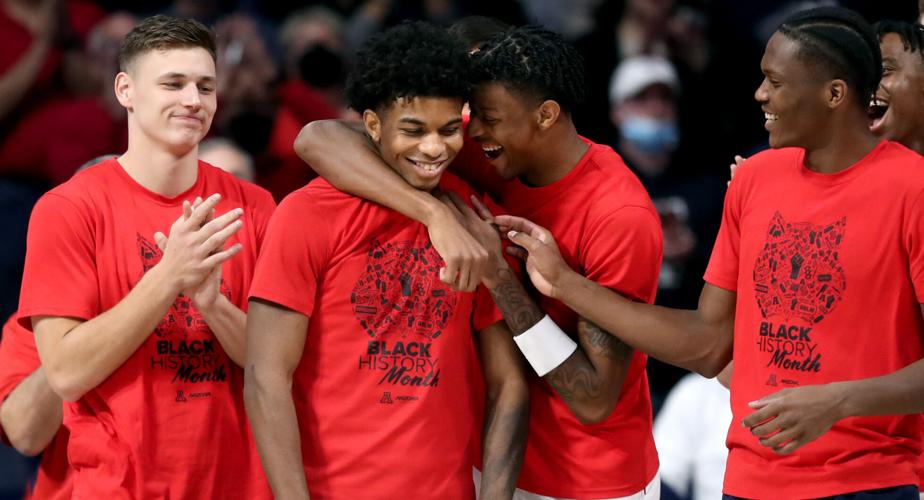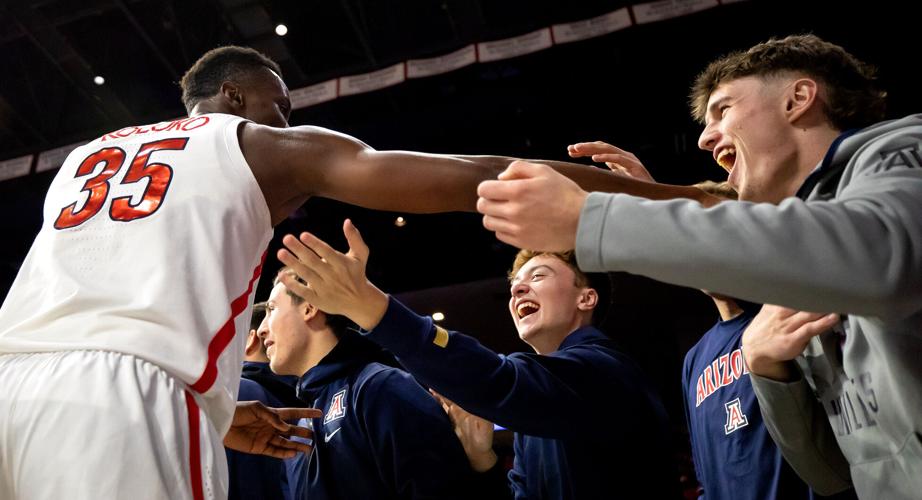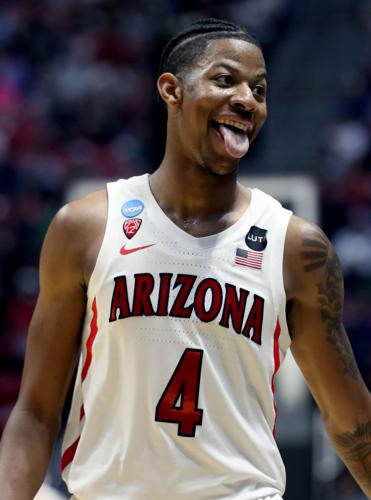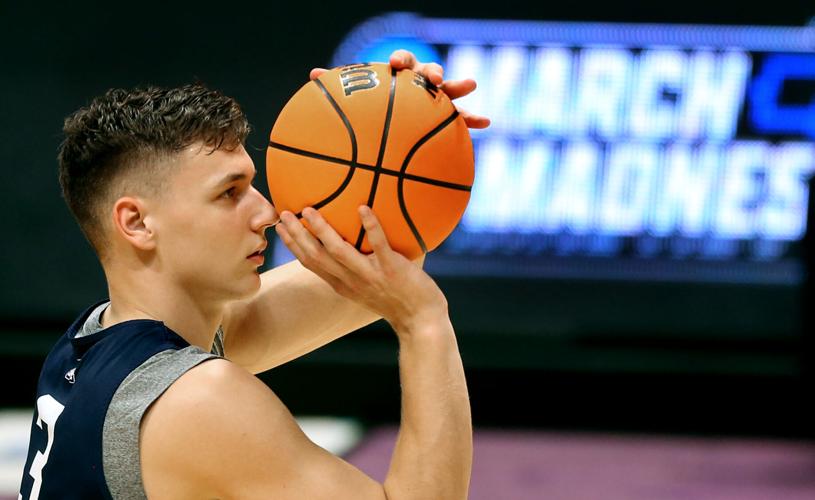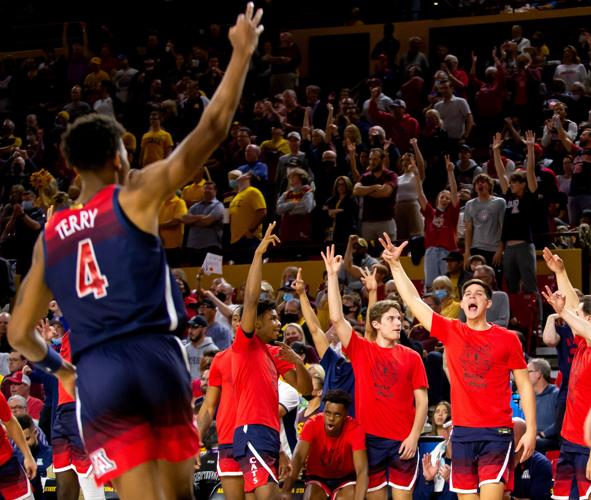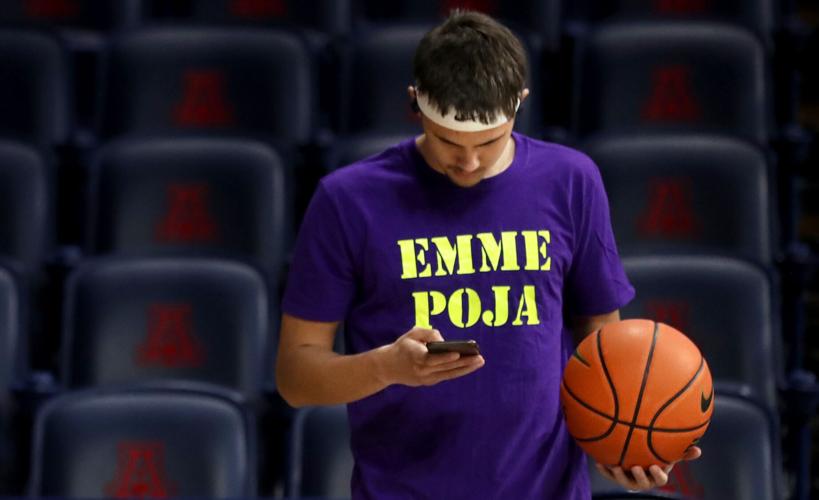By now, it’s pretty clear who the Arizona Wildcats are on the court: A fast-paced, pass-happy, fearless group that rolled over the Pac-12 and into the Sweet 16.
Getting to know the 16 Wildcat players off the court has been a little trickier. Arizona’s sophomore core arrived just before the heavily COVID-restricted 2020-21 season, when all media interviews were done over Zoom. The protocols continue heading into this weekend's Sweet 16 games; locker rooms, which are typically open for the postseason, have been closed.
Here are some of the most fascinating stories about 16 Wildcats players, from superstars Bennedict Mahturin and Christian Koloko to "T-Locs" Will Menaugh and Grant Weitman:
Justin Kier, senior guard from Virginia
A native of the Shenandoah Valley town of Grottoes, Virginia, Kier played five college basketball seasons in the Southeast before opting to spend his super senior year at Arizona.
The chance to play a key role for the Pac-12 champions — and enjoy the Pac-12 footprint — have both worked out pretty well.

The team gathers around Arizona Wildcats guard Justin Kier during his Senior Day ceremony.
Teammates “always make fun of me because I have my phone all the time taking pictures and videos to send back home because I’ve never been on the West Coast before,” Kier said. “These are just memories for me. It’s just been amazing places, great scenery.”
Christian Koloko, junior center from Cameroon
Identified as a top prospect at age 17 during a Basketball Without Borders camp in South Africa, Koloko soon headed to the United States to play high school basketball and try to keep developing at a U.S. college. His parents arranged to have him move in with his sister, Stephanie, who was living and working in Southern California after picking up an MBA at Long Beach State.
The only problem was Koloko spoke virtually no English when joined a new team, new culture and new language as a high school junior.
“I knew the basics, but I couldn’t have a conversation with someone,” Koloko said. “I couldn’t speak at school. I was always on the side, by myself, on my phone.”
He proved a quick study. Koloko managed to pull off a 3.8 GPA as a junior while attracting attention from high-major colleges that also included Harvard, Northwestern and Princeton
Since then, his basketball progression has been just as dramatic. Koloko transferred to star-studded Sierra Canyon School as a senior, played a limited role for the Wildcats as a freshman in 2019-20, then started most of last season before morphing into the Pac-12’s Defensive Player of the Year this season.
Jordan Mains, junior forward from Phoenix
Having arrived at the UA along with Phoenix Pinnacle High School teammate Nico Mannion, Mains actually started his Arizona career as a manager in the fall of 2019 while rehabilitating a knee injury that kept him out most of his senior season.
After he was cleared to play for the spring semester, Mains put on a uniform, playing in two Pac-12 games in 2019-20 and two more last season. This season, he’s played in 15 games, collecting a point and two rebounds against NAU in a particularly meaningful family affair: His brother, Nik, is a starting forward for the Lumberjacks.
Bennedict Mathurin, sophomore wing from Montreal
The multilingual Canadian with Haitian roots spoke French, English and Creole before picking up Spanish during a stint with the NBA Academy Latin America in Mexico City, where he teamed with UA center Oumar Ballo.
He was also a multitalented athlete growing up in Quebec, playing quarterback for a youth football club and also, of course, Canada’s national pastime.
“Hockey was different,” Mathurin said in 2020. “I was skating fast but I didn’t know how to slow down, so I was always crashing into the glass.”
But Mathurin’s youth was also tinged with tragedy. Raised in Montreal by a mother who moved from Haiti to study in Montreal and work in a hospital, and also by a legal guardian, Mathurin was 12 when his older brother was killed in a bicycle accident at age 15.
“My brother was like my best friend,” Mathurin said in 2020. “I was always hanging out with him. My brother has always been there for me. He was playing basketball and was one of the best on his team and I just wanted to follow his steps.”
Kerr Kriisa, sophomore guard from Estonia
Until UA associate head coach Jack Murphy began texting him photos of Steve Kerr’s jersey on the McKale Center walls during his recruitment, Kriisa had no idea Steve Kerr ever played for Arizona.
He just knew he was named after Steve Kerr of the Chicago Bulls, since his dad, Valmo, was a professional player in Europe who really admired the Michael Jordan-era Bulls teams.
“It’s hilarious,” Kriisa said from Germany in April 2020, where he was then riding out coronavirus restrictions with family members. “Steve was playing with Jordan and since my dad was a basketball player, from there, it became the name.

Arizona guard Kerr Kriisa gets his playlist set before taking the court for the team's Jan. 13 game. "Emme Poja" means "mama's boy" in Estonian.
“If you’re a basketball player, you basically follow a lot of leagues and a lot of players. So, for sure, my dad can’t bring up a name like Kerr out of nowhere.”
Valmo Kriisa played 16 seasons as a pro and was named the 2007 Estonian Player of the Year, while his son developed in Estonian youth programs and later on the Zalgiris II club team in Kaunas, Lithuania.
When the senior Zalgiris team called Kerr Kriisa up to play in a Euroleague game in October 2019, the crowd of 14,828 gave him a standing ovation as he shot free throws.
“It was a really special moment,” Kriisa said. “Especially because I’m not from Lithuania.”
Dalen Terry, sophomore guard from Phoenix
Not only did Terry grow up a Wildcats basketball fan in Phoenix, but he also briefly played under the point guard of UA’s 1997 national champions.
During the early portions of his senior year at Phoenix Hillcrest Prep, Terry was coached by Mike Bibby, who was a freshman point guard on that 1997 Arizona team.
“He works on my shot a lot,” Terry said in December 2019. “I feel like he was one of the better shooters in the NBA, so why not listen to him?”
And watch him.
“He tells me to watch his highlights all the time,” Terry said, smiling, and he has — Bibby’s NBA highlights and even the entire 1997 national championship game, when Bibby had 19 points, nine rebounds and four assists against Kentucky.
“It was definitely cool. I want to bring that to the University of Arizona,” Terry said then. “When I was down there I saw a video of his jersey. He was laughing that he was so skinny then, and now he’s all buff.”

Arizona guard Dalen Terry looks into the crowd during the second half of the Wildcats' NCAA Tournament win over TCU.
If Terry helps lead the Wildcats to the Final Four this season, he’ll be doing the same as Bibby did exactly 25 years ago.
Before he left Hillcrest later in December 2019, Bibby said some of the same things that UA coach Tommy Lloyd says now: That it’s sometimes a matter of subtracting, not adding, to Terry’s game.
“With D.T., there’s a lot of extra stuff that he was doing out there that he didn’t need to,” Bibby said. “He was making the game too hard. (It’s about) use less dribbles, use less moves to the basket. I mean, that’s all it takes. Once they realize that, it’s easy, they’ll be fine.”
Oumar Ballo, sophomore center from Mali
In some ways, it’s no wonder Ballo isn’t in the hurry most young players are to reach the spotlight, staying patient in a limited role last season at Gonzaga and early this season at Arizona. Because he’s already been there.
When he was just 14, Ballo led his native Mali to the 2017 FIBA U16 Africa championships, averaging 14 points and 13 rebounds. A year later, he helped his country win another gold in the U18 FIBA Africa championships and helped Mali reach the championship game of the FIBA U19 World Championships in 2019. He played again for Mali in the U19 World Cup last summer.
For years already, there have been people walking around Mali with jerseys labeled “Ballo,” “Baby Ballo” and “Ballo Junior.” Some babies have been named after him, too.
“Honestly, it's been great,” Ballo said after committing to Arizona last April. “Even today, if I go back home there will be people named after me and I have to really give back to those people. They are looking at me. So I have to be an example for them.
“It’s a lot to take as a young age, but at the same time, I just have to be myself. Those people are named after me because of me, so I don't really try to be anyone else.”
Ballo is also pretty worldly after all that experience. He left home as a 13-year-old to play at a school in the Canary Islands, and was so good that FC Barcelona offered him a six-year contract to play professionally on the Spanish mainland and potentially develop into one of its senior team players.
Ballo instead opted to play for the NBA Academy Latin America during the 2018-19 school year, and aim for the U.S. college basketball route, with the academy hiring a teacher who helped him achieve college eligibility.
“At the end of the year, they wouldn't even let me play basketball because they were more worried about my school than playing basketball,” Ballo said. “That’s when I knew those people were the right people, that they didn't want anything from me but the best. They put me in a situation to be here today. So I am really thankful for my journey.”
Along the way, however, Ballo had to toss aside his first sports love, soccer. The son of a 6-foot-2-inch mother and a 6-7 father — with a 7-foot older brother who played professionally in France — Ballo realized at a young age that he wasn’t going to have much of a choice.
“I was actually a great goalie for my school but I got so much bigger and I couldn't play that role anymore,” Ballo said. “When I was 11 I used to play them both, and at 12 I was too tall to be a goalie. I tried to play a little outside defender and played basketball at the same time. But at 13, I just stopped playing soccer and focused on basketball.”
Azuolas Tubelis, sophomore power forward from Lithuania
Despite having arrived at Arizona in August 2020 with limited knowledge of English — and having to take classes fully online to start out — Azuolas Tubelis and his twin brother Tautvilas say they have become much more comfortable academically.
Maybe that’s a result of all the preparation work they did in the classroom as high school students in Vilnius, Lithuania, after having to cut short their playtime a bit.
“When we were younger, I think we went outside every evening after school just to play basketball with our friends from the neighborhood,” Azuolas Tubelis said. “We played soccer. We played hide and seek a lot, volleyball, played a lot of things. But then we stopped going outside because in high school, you need to study harder.
“Then we had two PCs, so we played a lot of computer games. We stayed up late. Maybe that was a mistake.”
Tautvilas Tubelis, sophomore wing from Lithuania
While Zu’s brother says he is at Arizona largely to support his brother, that doesn’t mean the fraternal twins don’t have a little rivalry going with their different games.
Their recollections of one-on-one games may differ slightly.
“I played for fun,” Azuolas said. “I don’t know about him. He was always sweating.”
Replied Tautvilas, “Tell me when you can guard me.”
Tautvilas has also found an outlet in watching American football, somewhat to his surprise.
"I didn’t know what football was at all, but right now I really love it,” he said. "At first it didn’t make sense for me. Everyone was just tackling. But right now I know the rules, and it’s really interesting."
Pelle Larsson, sophomore guard from Sweden
If some opponents, and their fans, don’t like the swagger Kerr Kriisa plays with, Larsson can relate. As a youth prospect in Sweden, playing national-team events against the point guard from across the Baltic Sea, he didn’t like Kriisa, either.
“I was never really friends with him. He was always the best guy on their team, so I was kind of mad at him for a while,” Larsson said. “But then we got really close. As soon as we got introduced to each other, we got really close.”

Arizona guard Pelle Larsson lines up a shot during pregame warmups before last week's NCAA Tournament win over Wright State.
As Kriisa’s teammate this season, Larsson has demonstrated significant versatility: Not only with his passing and shooting touch but with the ability to defend virtually anyone on the court.
As a result, it’s probably no surprise he’s pretty good at other sports, too.
"There’s a sport in Europe called padel," he said. "It’s like a tennis court with walls that I’m actually pretty good at. I think it comes from Spain, but in Sweden, it’s really taken off."
Grant Weitman, sophomore guard from Tucson
Weitman grew up in Tucson with a long basketball lineage. A former standout at Salpointe Catholic High School, having led the Lancers to the Class 4A state title in 2020, he is the grandson of Paul Weitman, a former basketball player and high school basketball coach in Georgia who moved to Tucson in the 1970s and runs what is now the Royal Automotive Group. Paul Weitman was also one of former UA coach Lute Olson’s best friends, frequently traveling with the Wildcats while also once naming a Breeders’ Cup champion horse “Midnight Lute.”
Grant’s father, Neal, was a two-sport star at Salpointe who went on to play football for the University of San Diego before returning to Tucson and eventually becoming the Royal Automotive Group’s general manager.
While Grant isn’t old enough to remember the height of the Olson era, he was there in person for the end of it.
“I know I went to some games but I vaguely remember them,” Grant said. “I kind of remember the stage between him and Sean Miller and then Sean’s teams … I got to meet (Olson) but I was never around him all that much. That was more my grandpa.”
Will Menaugh, freshman forward from Tucson
Another holdover from Miller’s last recruiting class, Menaugh stuck with Arizona through the transition to Tommy Lloyd.

Arizona guard Dalen Terry and the Arizona bench celebrate a 3-pointer in the team's Feb. 7 win over ASU in Tempe.
He had received mid- and low-major recruiting interest out of Catalina Foothills High School, but had already landed an academic scholarship to UA.
He also stayed, maybe, because he was simply born to be at Arizona.
“I’m a third-generation Wildcat,” Menaugh said. ”All four of my grandparents and my parents went here."
Adama Bal, freshman wing from France
Of Arizona’s 11 scholarship players, the Wildcats actually have more French speakers (four) than native English speakers (three): Ballo, Koloko and Mathurin also speak a version of French from their native countries, while Bal is from Paris.
So guess which player speaks the best version of French (or thinks he does)?
“Uh. Me,” Bal said. “Benn, he's talking like a Canadian person. When I'm talking with Benn, I can use some complicated words and he's gonna get it because he's speaking French, but when I'm talking with Oumar, it's like I'm talking to a friend or something like that. .. It’s the slang of friends.”
But together, they all speak French well enough to have helped Bal adjust quickly as the last player to arrive late last summer, moving into an English-speaking college and basketball program.
“My first day here was complicated, brand new in a new country, and they helped me a lot,” Bal said in September. “They showed me how things worked here, they gave me some advice and it was best for me to have some guys like that.
“On the court and outside, it’s a brand new country and everything is different.”
Shane Nowell, freshman guard from Washington
The younger brother of Jaylen Nowell, who won the Pac-12 Player of the Year award at Washington in 2018-19, Shane Nowell is the only one of Miller’s 2021 scholarship recruits to stick with the Wildcats.
He didn’t re-commit until about a month after Lloyd was hired as Arizona’s new coach last April.
“It definitely took some time because I wasn’t too sure,” Nowell said. “It was pretty much a matter of what’s the best situation for me, as well as my family, because I didn’t want to go too far away from home. But then also once I got to know Coach Lloyd, got to see his coaching style, to see how he plans to really incorporate me, I really liked what he had to say. So it just felt like it was the best scenario.”
Nowell has played only briefly in 19 games this season and did not suit up for three others. Lloyd has praised his long-term potential.
Ben Ackerley, freshman guard from Washington
Ackerley grew up in the Seattle area watching Washington basketball along with his father, Ted, a longtime Huskies season-ticket holder. He’s also the nephew of Chris Ackerley, a UA grad who is on the National Board of Advisers for the Eller College of Management.
Chris and Ted Ackerley are also part of the ownership group of the NHL’s Seattle Kraken. And while Ted actually attended UCLA and has been a longtime Washington fan, he showed up to watch the Wildcats play the Huskies on Feb. 12 in Seattle while wearing Arizona red.
"When you’ve got blood on the team, it’s a no-brainer," Ted Ackerley said.
Addison Arnold, freshman guard from California
Arnold was named “Comeback Player of the Year” by the Simi Valley Acorn after overcoming surgery to fix ligaments that were creating chronic sprains in both ankles. Also suffering from a fractured bone in his back, Arnold was stuck in a wheelchair for a month and a half while rehabilitating.
But he returned toward the end of his junior season and averaged 22.6 points, 8.6 rebounds and 2.7 assists as a senior last season.
"For sure, it was disappointing not being able to play, but it never crossed my mind that I might not play again," Arnold told the Ventura County Star. "I told myself that I would do whatever it takes to get out on the court again. I knew it was going to take a lot of hard work. I had no doubt I would get it done."
Like many of his teammates, Arnold also has basketball in his blood: His father, Gib, played for ASU (1987-88) and UC San Diego (1991-92) and eventually was Hawaii’s head coach from 2010-14, where Addison Arnold said he grew to enjoy surfing.


